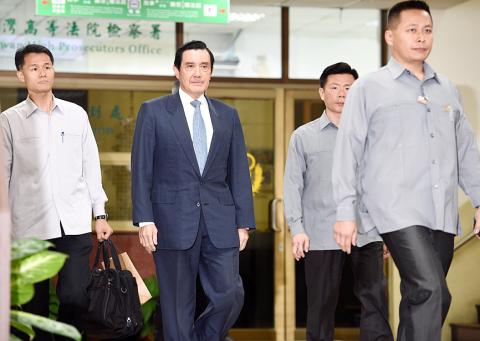Former president Ma Ying-jeou (馬英九) violated the Constitution and abused his presidential authority when he leaked confidential information obtained from a wiretap in a case that was under judicial review, prosecutors and lawyers said yesterday as the Taiwan High Court began hearing an appeal of a lower court ruling in March that found Ma not guilty.
The Taiwan High Prosecutors’ Office said it had determined there were sufficient grounds to appeal the district court’s ruling in a libel case filed by Democratic Progressive Party (DPP) caucus whip Ker Chien-ming (柯建銘).
One of Ker’s attorneys, Tseng Chin-yuan (曾勁元), said it was wrong for Ma to decide that he had the constitutional right as president to provide consultations on a dispute involving two or more of the branches of government, leading to what Tseng called “catastrophic harm” to the Constitution and the nation.

Photo: Peter Lo, Taipei Times
Ma’s defense in the first trial used that interpretation to shield violations of the law, as Ma discussed with then-state prosecutor-general Huang Shih-ming (黃世銘) leaked confidential information relating to a judicial probe into an influence peddling case, Tseng said.
Attorneys representing the two sides argued on varying interpretations regarding Article 44 of the Constitution, which states: “In cases of disputes involving two or more Yuans other than those for which provisions are made in this Constitution, the president may call a meeting of the presidents of the Yuans concerned for consultation with a view to reaching a solution.”
Prosecutors yesterday said the not guilty verdict was the result of a wrongful interpretation of Article 44, which had contravened the normative understanding of the law, and they called on the Taiwan High Court judges to convict Ma.
Chen I-ming (陳一銘), another lawyer for Ker, said Ma had caused grave damage to the Constitution, as based on earlier legal interpretations, the president can only apply his authority for consulting on disputes between the Yuans when there is no other recourse to settle the dispute.
“However, it was not so for this case,” Chen said.
Ma was worried at the time about the Legislative Yuan and the Executive Yuan boycotting the state budget, or potentially using other administrative procedures to stall the legislative process, Chen said.
Ma spoke on his own behalf yesterday, saying he had been found not guilty through all the previous rulings on the case, and the Taiwan High Court should rule so again.
Ker accused Ma of aggravated libel after Ma criticized him during a news conference on Sept. 11, 2013, for alleged involvement in influence peddling,
Ma had labeled Ker’s alleged actions as “shameful.”

Chinese Nationalist Party (KMT) Chairman Eric Chu (朱立倫), spokeswoman Yang Chih-yu (楊智伃) and Legislator Hsieh Lung-chieh (謝龍介) would be summoned by police for questioning for leading an illegal assembly on Thursday evening last week, Minister of the Interior Liu Shyh-fang (劉世芳) said today. The three KMT officials led an assembly outside the Taipei City Prosecutors’ Office, a restricted area where public assembly is not allowed, protesting the questioning of several KMT staff and searches of KMT headquarters and offices in a recall petition forgery case. Chu, Yang and Hsieh are all suspected of contravening the Assembly and Parade Act (集會遊行法) by holding

PRAISE: Japanese visitor Takashi Kubota said the Taiwanese temple architecture images showcased in the AI Art Gallery were the most impressive displays he saw Taiwan does not have an official pavilion at the World Expo in Osaka, Japan, because of its diplomatic predicament, but the government-backed Tech World pavilion is drawing interest with its unique recreations of works by Taiwanese artists. The pavilion features an artificial intelligence (AI)-based art gallery showcasing works of famous Taiwanese artists from the Japanese colonial period using innovative technologies. Among its main simulated displays are Eastern gouache paintings by Chen Chin (陳進), Lin Yu-shan (林玉山) and Kuo Hsueh-hu (郭雪湖), who were the three young Taiwanese painters selected for the East Asian Painting exhibition in 1927. Gouache is a water-based

Taiwan would welcome the return of Honduras as a diplomatic ally if its next president decides to make such a move, Minister of Foreign Affairs Lin Chia-lung (林佳龍) said yesterday. “Of course, we would welcome Honduras if they want to restore diplomatic ties with Taiwan after their elections,” Lin said at a meeting of the legislature’s Foreign Affairs and National Defense Committee, when asked to comment on statements made by two of the three Honduran presidential candidates during the presidential campaign in the Central American country. Taiwan is paying close attention to the region as a whole in the wake of a

OFF-TARGET: More than 30,000 participants were expected to take part in the Games next month, but only 6,550 foreign and 19,400 Taiwanese athletes have registered Taipei city councilors yesterday blasted the organizers of next month’s World Masters Games over sudden timetable and venue changes, which they said have caused thousands of participants to back out of the international sporting event, among other organizational issues. They also cited visa delays and political interference by China as reasons many foreign athletes are requesting refunds for the event, to be held from May 17 to 30. Jointly organized by the Taipei and New Taipei City governments, the games have been rocked by numerous controversies since preparations began in 2020. Taipei City Councilor Lin Yen-feng (林延鳳) said yesterday that new measures by